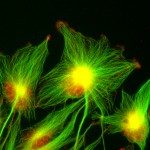Lien vers Pubmed [PMID] – 31597743
J. Cell. Sci. 2019 Oct;132(19)
Cell adhesion to the extracellular matrix is essential for cellular processes, such as migration and invasion. In response to cues from the microenvironment, integrin-mediated adhesions alter cellular behaviour through cytoskeletal rearrangements. The tight association of the actin cytoskeleton with adhesive structures has been extensively studied, whereas the microtubule network in this context has gathered far less attention. In recent years, however, microtubules have emerged as key regulators of cell adhesion and migration through their participation in adhesion turnover and cellular signalling. In this Review, we focus on the interactions between microtubules and integrin-mediated adhesions, in particular, focal adhesions and podosomes. Starting with the association of microtubules with these adhesive structures, we describe the classical role of microtubules in vesicular trafficking, which is involved in the turnover of cell adhesions, before discussing how microtubules can also influence the actin-focal adhesion interplay through RhoGTPase signalling, thereby orchestrating a very crucial crosstalk between the cytoskeletal networks and adhesions.

